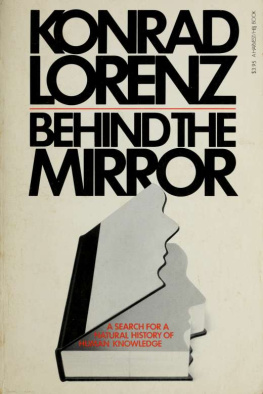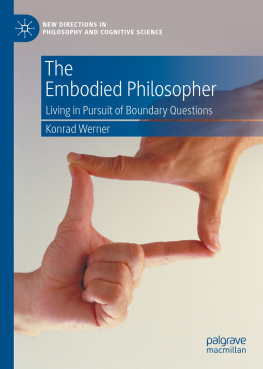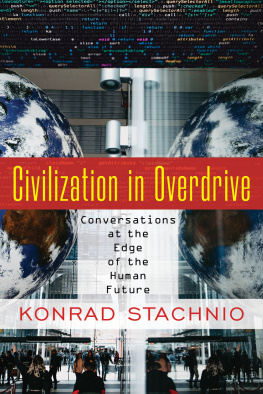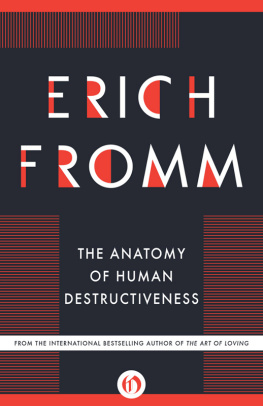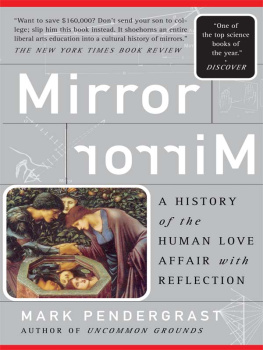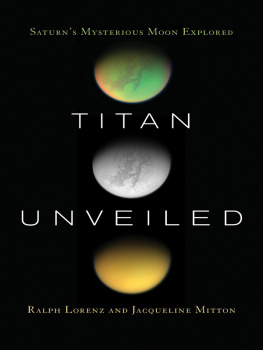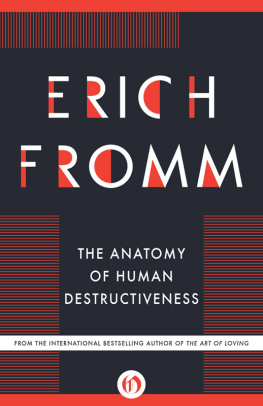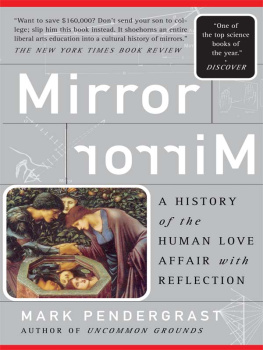Konrad Lorenz - Behind the mirror : a search for a natural history of human knowledge
Here you can read online Konrad Lorenz - Behind the mirror : a search for a natural history of human knowledge full text of the book (entire story) in english for free. Download pdf and epub, get meaning, cover and reviews about this ebook. City: New York, year: 1978, publisher: Harcourt Brace Jovanovich, genre: Science. Description of the work, (preface) as well as reviews are available. Best literature library LitArk.com created for fans of good reading and offers a wide selection of genres:
Romance novel
Science fiction
Adventure
Detective
Science
History
Home and family
Prose
Art
Politics
Computer
Non-fiction
Religion
Business
Children
Humor
Choose a favorite category and find really read worthwhile books. Enjoy immersion in the world of imagination, feel the emotions of the characters or learn something new for yourself, make an fascinating discovery.
- Book:Behind the mirror : a search for a natural history of human knowledge
- Author:
- Publisher:Harcourt Brace Jovanovich
- Genre:
- Year:1978
- City:New York
- Rating:5 / 5
- Favourites:Add to favourites
- Your mark:
- 100
- 1
- 2
- 3
- 4
- 5
Behind the mirror : a search for a natural history of human knowledge: summary, description and annotation
We offer to read an annotation, description, summary or preface (depends on what the author of the book "Behind the mirror : a search for a natural history of human knowledge" wrote himself). If you haven't found the necessary information about the book — write in the comments, we will try to find it.
Konrad Lorenz: author's other books
Who wrote Behind the mirror : a search for a natural history of human knowledge? Find out the surname, the name of the author of the book and a list of all author's works by series.
Behind the mirror : a search for a natural history of human knowledge — read online for free the complete book (whole text) full work
Below is the text of the book, divided by pages. System saving the place of the last page read, allows you to conveniently read the book "Behind the mirror : a search for a natural history of human knowledge" online for free, without having to search again every time where you left off. Put a bookmark, and you can go to the page where you finished reading at any time.
Font size:
Interval:
Bookmark:

This book made available by the Internet Archive.





Translator's note
It is my pleasure to acknowledge the help of Dr Konrad Lorenz in the preparation of this translation. I am also much indebted to Dr Malcolm Dando and his wife for giving me valuable advice on matters of scientific detail.
R.T.
Epistemological prolegomena
War' nicht das Auge sonnenhaft, Die Sonne konnt' es nie erblicken. ('If the eye were not sunlike, it could never see the sun'.) Goethe
1 The problem
The corner-stone of the scientific method is the postulate that nature is objective'. Thus writes Jacques Monod in his well-known work Chance and Necessity. And he goes on: 'To be sure, neither reason, nor logic, nor observation ... had been lacking among Descartes's predecessors. What was still needed was the strict investigation and analysis imposed by the postulate of objectivity.*
It is important to realize that these statements contain two postulates, one concerned with the object of scientific research, the other directed at the scientist himself. In the first place one obviously has to assume the material existence of the object of one's investigation if the investigation is to have any meaning. At the same time, there are certain obligations incumbent on the scientist which are far from easy to define. If they were, there would be no need for me to write this book.
These obligations involve an attitude towards knowledge which seems obvious to the biologist but is far from universally accepted by philosophers and psychologists, i.e. the assumption that all human knowledge derives from a process of interaction between man as a physical entity, an active, perceiving subject, and the realities of an equally physical external world, the object of man's perception.
The somewhat confusing origin of the two words 'subject' and 'object' is worth noting. It is a mark of their imprecision that they
have exchanged meanings* since the age of scholasticism. In our present usage the word 'subject' means the experiencing, thinking, feeling agent as opposed to the objects which the agent experiences, rhinks and feels. Literally subjectum means 'what is thrown under', in the sense of a foundation on which our whole world is based. Leibniz equated the subject with Vame meme t 'the soul itself. Everything we are capable of experiencing, including all we know about objective reality outside and around us, is based on the experiences of this subject, as are all our thoughts and desires. The knowledge of one's own existence expressed in the Cartesian cogito ergo sum remains the most certain of all knowledge, in spite of the erroneous subjective-idealist conclusions that have been drawn from it. A considerable part of this book is devoted to refuting such conclusions.
Knowing, thinking and willing, even the observation and perception preceding them, are activities. It is strange that for the most vital, most dynamic force that there is in the world we should have found no better term than 'subject', a past participle and thus passive! How is it that from this word 'subject', which denotes the foundation of all knowledge and experience, we derive the adjective 'subjective', defined inter alia as 'illusory, fanciful, arbitrary, prejudiced'? And how, in what is obviously a complementary development to this devaluation of the subjective, have we arrived at our high estimation of what is popularly called 'objective' or, which is the same thing, 'corresponding to something real'?
That such assessments should have found their way into everyday language shows that there is a general attitude, clearly definable, though not usually conscious and deliberate, towards the relationship between the perceiving subject and the object of perception. We all realize that, alongside our perception of external realities, we also undergo experiences in which our own fluctuating mental states are caught up, with subjective and objective factors superimposed on each other. We have learnt to take into account, and to compensate for, the effect which our own internal' physiological states have on our perception of external realities. If I go back into my house one winter's day after having been out of doors for some while, and stroke my grandson's cheek with my hand, it will feel as though he had a fever. But it never occurs to me to suspect that he is sick, since I know that my sensation is due to the temperature of my own cold hand.
This familiar sequence of events represents a good example of a process that is of fundamental importance in our knowledge of objective reality. It brings us closer to cognition of things 'as they really are' by taking into account processes and circumstances present in the observer himself. For every time we succeed in tracing an element in our experience to 'subjective' factors, and in then excluding it from the image we form of extra-subjective reality, we come a step closer to that which exists independently of our cognition.
We construct our image of 'objective* reality by making a series of steps of this kind. The world of objects, the material world of our experience, only takes shape through our eliminating the subjective and the contingent. What causes us to believe in the reality of things is in the last analysis the constancy with which certain external impressions recur in our experience, always simultaneously and always in the same regular pattern, irrespective of variations in external conditions or in our psychological disposition. It is the insusceptibility of such groups of phenomena to contingent or subjective influences that leads us to regard these phenomena as manifestations of a reality independent of all perception, as an invariable reality which we recognize as such precisely by virtue of its in-dwelling characteristics. This is why I describe the activity of abstracting constant properties by the verb 'objectivating', and its achievements by the noun 'objectivation'.
Many philosophers who do not think in biological terms labour under the illusion that by the mere exercise of the 'will to objectivity' we are in a position to rid ourselves of all personal, subjective, one-sided attitudes, prejudices, passions and so on and elevate ourselves to a position from which to utter final verdicts and universal value judgements. In order to be able to do this we need a scientific understanding of the cognitive processes in the subjective observer. The process of understanding and the characteristics of the object to be understood can only be studied simultaneously. 'The object of knowledge and the instrument of knowledge cannot legitimately be separated but must be taken together as one whole', wrote P. W. Bridgman in an article on Niels Bohr's attitude to the theory of knowledge. Monod's forceful demand for objectivity can never be fully met, but only to the extent that we succeed, as scientists, in understanding the interaction between the perceiving subject and the perceived object, between the 'instrument of knowledge' and the 'object of knowledge'.
Font size:
Interval:
Bookmark:
Similar books «Behind the mirror : a search for a natural history of human knowledge»
Look at similar books to Behind the mirror : a search for a natural history of human knowledge. We have selected literature similar in name and meaning in the hope of providing readers with more options to find new, interesting, not yet read works.
Discussion, reviews of the book Behind the mirror : a search for a natural history of human knowledge and just readers' own opinions. Leave your comments, write what you think about the work, its meaning or the main characters. Specify what exactly you liked and what you didn't like, and why you think so.

